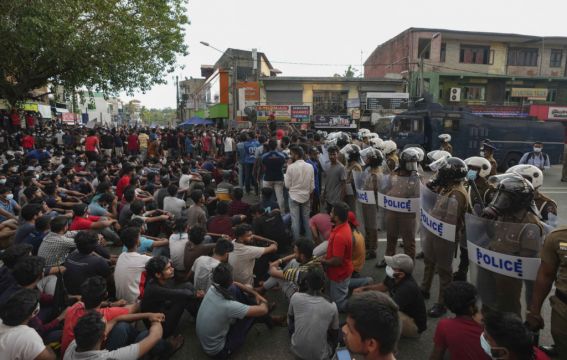Sri Lanka’s sports minister and the president’s nephew, Namal Rajapaksa, has resigned amid growing public outrage over the country’s economic crisis and shortages of food, fuel and medicines.
The entire Sri Lankan Cabinet also handed over letters to Prime Minister Mahinda Rajapaksa offering to resign from their positions due to the economic crisis, Education Minister Dinesh Gunawardena told reporters on Sunday.
“I have informed the secretary to the president of my resignation from all portfolios with immediate effect…,” Namal Rajapaksa tweeted, saying he hopes his decision helps President Gotabaya Rajapaksa and PM Mahinda Rajapaksa, who is his father, in establishing stability for the people and the government.
I have informed the sec. to the President of my resignation from all portfolios with immediate effect, in hope that it may assist HE & PMs decision to establish stability for the people & the govt of #LKA. I remain committed to my voters, my party & the people of #Hambanthota.
— Namal Rajapaksa (@RajapaksaNamal) April 3, 2022
Advertisement
Namal Rajapaksa also held the portfolio of youth affairs.
Mr Gunawardena said the president and the prime minister will take appropriate action on the Cabinet’s offer to resign.
Government coalition parties are demanding that a caretaker Cabinet be appointed to pull the country out of the crisis.
The actions appear to be efforts to pacify the people, who are protesting countrywide in bid to hold the president and the entire Rajapaksa family responsible.

Sri Lanka’s political power is concentrated in the Rajapaksa family. In addition to brothers being president and prime minister, two other brothers are ministers of finance and irrigation.
On Sunday, Sri Lankan professionals, students and even mothers with small children defied an emergency decree and curfew to demand the president’s resignation.
Police fired tear gas and water cannons at hundreds of university students who were trying to break through barricades near the town of Kandy in the tea-growing region.
Near Colombo, students demonstrated while armed soldiers and police stopped opposition lawmakers from marching to Independence Square.

“This is unconstitutional,” opposition leader Sajith Premadasa told the troops who blocked their path. “You are violating the law. Please think of the people who are suffering. Why are you protecting a government like this?”
For several months, Sri Lankans have endured long queues to buy fuel, foods and medicines, most of which comes from abroad and is paid for in hard currency.
The first to disappear from shops was milk powder and cooking gas, followed by a fuel shortage disrupting transport and causing rolling power cuts lasting several hours a day at the end of February.
The extent of the crisis became clear when Sri Lanka could not pay for imports of basic supplies because of its huge debts and dwindling foreign reserves.
The country’s usable foreign reserves are said to be less that 400 million dollars, according to experts, and it has nearly 7 billion dollars in foreign debt obligations for this year alone.
President Gotabaya Rajapaksa last month said his government was in talks with the International Monetary Fund and turned to China and India for loans while he appealed to people to limit the use of fuel and electricity and “extend their support to the country”.
As protests grew and calls increased for him to step down, Mr Rajapaksa doubled down and at midnight on Friday assumed emergency powers by decree. The government also declared a countrywide curfew until Monday morning.

It did little to quell the anger of thousands, many first-time protesters, who felt fed up and exhausted by the crisis.
“In this country it is so difficult,” said Inoma Fazil, a fashion designer who brought her 18-month-old daughter to a protest in Rajagiriya, a Colombo suburb.
“We don’t want to leave the country and go, and we want to give our child a good future, but everyone is stealing our money. So we came here for her and the rest of the children.”







